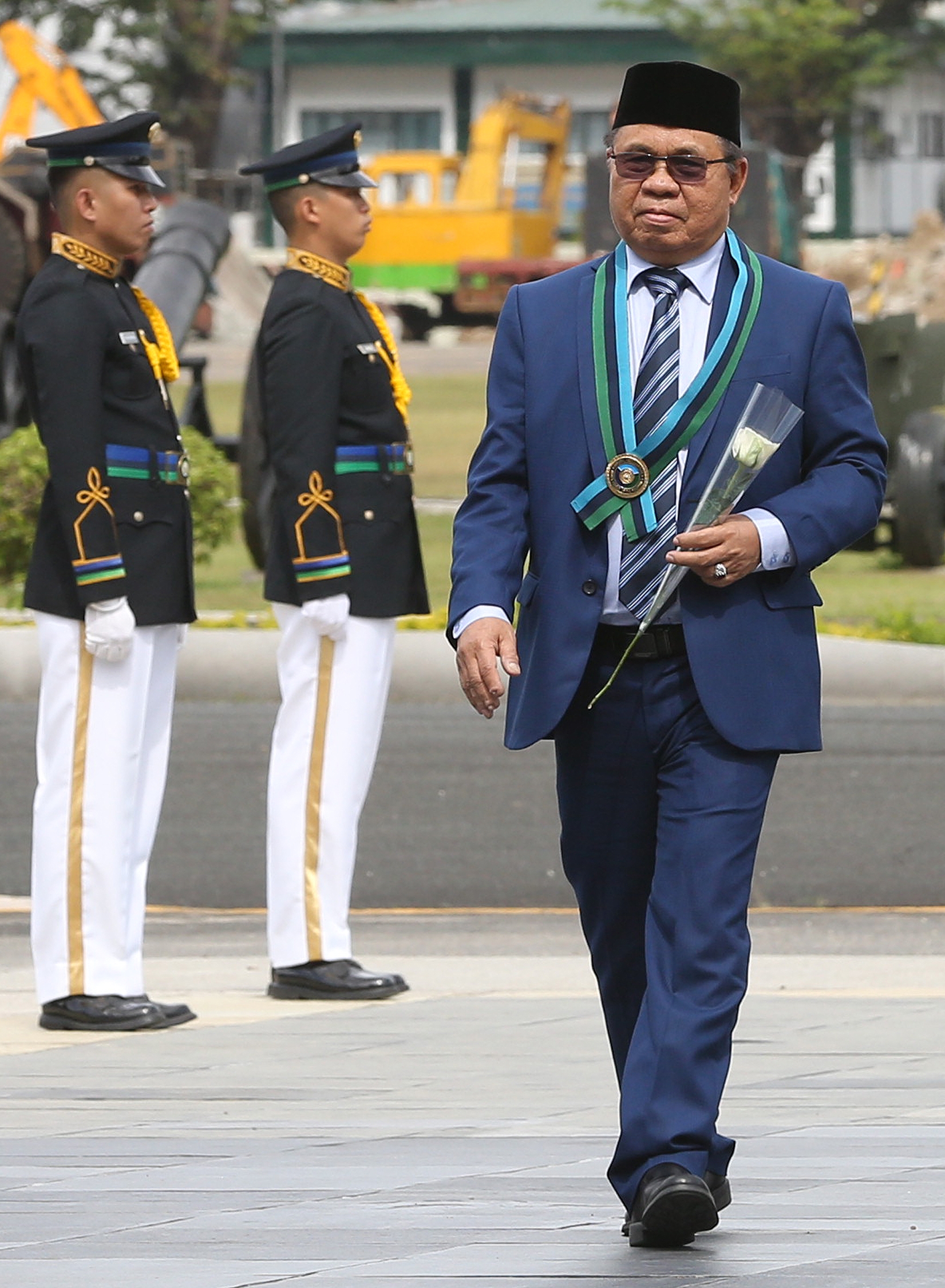COTABATO CITY—After half a century as a Moro revolutionary, Murad Ebrahim, the chair of the Moro Islamic Liberation Front (MILF), is ready to join the government as head of the new Bangsamoro Autonomous Region in Muslim Mindanao (BARMM).
Earlier endorsed by the MILF central committee as interim chief minister of the Bangsamoro parliament, Murad took his oath on Friday in Malacañang along with the 41 nominees of the MILF to the 80-member Bangsamoro Transition Authority (BTA).
The BTA will run the Bangsa-moro parliament until BARMM’s first regular elections in 2022.
But who is Murad? What brought him to his post in the Bangsamoro?
He has been popularly known as Al Haj Murad, but his real name is Ahod Balawag Ebrahim. He adopted Murad only as a nom de guerre after he joined the Moro struggle, first as member of the Moro National Liberation Front (MNLF) and later, the MILF.
“I live a simple life, with almost 50 years spent in the underground armed struggle of the Bangsamoro against the government,” said Murad, now 70.
In 1968, Murad was in his final year as a civil engineering student at Catholic-run Notre Dame University in Cotabato City when he was recruited to the MNLF founded by Nur Misuari. He formed part of the “Top 300,” the second batch of Moro fighters who trained in Malaysia.
He headed the MNLF’s Kutawato Revolutionary Committee, which fought the military and the dreaded Ilaga paramilitary group in Central Mindanao in the 1970s.
Ideological differences
But due to ideological differences, Murad and others in the MNLF broke with Misuari and, with former MNLF vice chair Salamat Hashim, formed the MILF in the late 1970s.
When Salamat, the MILF founding chair, died of an illness in July 2003, Murad took over the position of the Egyptian-trained cleric.
Before he assumed that post, Murad had the reputation of being the MILF’s top hawk and guerrilla commander as vice chair for military affairs and chief of staff of the Bangsamoro Islamic Armed Forces (BIAF), the MILF’s armed wing.
He eluded capture during the all-out war waged by then President Joseph Estrada in 2000 and the 2003 Buliok campaign during the Arroyo administration.
The MILF’s Camp Abubakar Al Siddique fell in 2000, and in 2003 government forces overran the Buliok complex, Salamat’s headquarters, which straddled parts of Pagalungan in Maguindanao province and Pikit, Cotabato province.
From early 2001 until he was appointed MILF chair in mid-2003, Murad concurrently served as the front’s chief negotiator in talks with the Philippine government.
Murad held a firm grip on power as chair for the last 15 years with no one in the MILF openly challenging his leadership.
Von Al Haq, BIAF spokesperson, described him “as a reasonable and fair leader.”
“[He exemplifies] leadership by example. When he was the BIAF chief, he would immediately address problems to prevent them from getting out of [hand],” Al Haq told the Inquirer.
Murad is also “approachable, diplomatic and does not have a temper,” he added.
Murad is married to Hadja Lupia Ebrahim and they have two children and 10 grandchildren.
“I am a family man,” he said.
Malaysian citizenship
The only controversy attached to Murad has been that he holds Malaysian citizenship, which he vehemently denies.
Malaysia brokered the Comprehensive Agreement on the Bangsamoro, the final peace agreement signed by the government and the MILF in 2014.
On Jan. 21, voters in the Autonomous Region in Muslim Mindanao (ARMM) ratified Republic Act No. 11054, or the Bangsamoro Organic Law, paving the way for the BARMM’s creation.
Cotabato City, which twice rejected inclusion to the ARMM, although it hosts the regional government center, voted this time to be part of the BARMM.
Cotabato inclusion
In the succeeding plebiscite on Feb. 6, 63 villages in Cotabato province also voted to be part of the new autonomous region. Lanao del Norte rejected the bid of six of its towns to join the BARMM.
After Friday’s oathtaking in Malacañang, the ARMM will formally hand over the reins of power to the BARMM. No date has been set for that.
What can the people expect from Murad now that he is part of the government he once fought?
“I would like to treat everybody equally,” he said. “I will not allow nepotism. I’d like to pursue good governance in the Bangsa-moro to counter the lingering ills such as graft and corruption.”
“My life is fully dedicated to the struggle of the Bangsamoro people,” he told the Inquirer. “Whatever we achieved, it is not for ourselves but for the sake of the next generation.”
